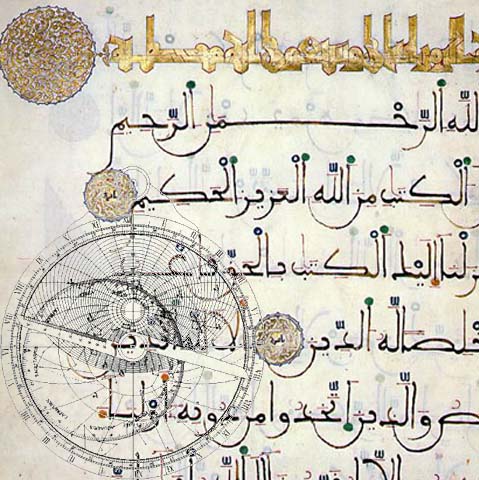
In Morocco a video has circulated recently that speaks of the necessity of Islamizing physics. The idea is wonderful in its way. It suggests a new theory that Muslims could contribute to the field of physics, a religiously formulated physical theory to counter those physical theories that were only created for some of the base, destructive dimensions of humanity (nuclear physics, for example, in its weaponization aspect).
BY A. MAZIGH
THE ISLAMIC COLLECTIVE imagination is vast enough to give us a feeling that we are finding a way to achieve those beautiful dreams. This imagination believes in heaven and creatively details what life will be like there. From here, our inspiration and genius can extend towards creating a path leading to those dreamed-of spaces, by means of the theory of time travel, as detailed in Einstein’s theoretical physics, to that beautiful infinite expanse they call heaven. Here I speak on a theoretical level using a physical logic, and not against the background of those actions available to extremist religious thought, where the action and its effect turn out to be completely physical and deludedly lead direct to heaven, by which I mean suicide operations. Such actions do not elaborate a rational physical theory, since from a physics perspective death is not a form of travel, but death to the act of moving itself.
I was expecting some sort of elaboration of physics in a religious-ethical sense, for instance, a human principle that had already been taken up by the human sciences with respect to new scientific discoveries that clash with natural processes, such as a position on cloning, or a position in medicine on what is termed ‘euthanasia’, or manufacturing spare parts for human organs, since all these are matters that require deep reflection. Some ‘Islamic’ approach to physics, mathematics, or in general, Islamic natural sciences should surely appear there.
But generally speaking, this is not what the shaykh who authored the video proposes. He actually proposes another, miraculous kind of physics. “Physics”, Yāsīn al-‘Umarī says, “must be Islamized!” And how are we to do this? When we talk about a physical or cosmic phenomenon, we are to add the words ‘Glory be to God!’ with a large exclamation mark. Problem solved – physics has become Islamic!
Such an action would place Him into absurdity, and absurdity cannot possibly be an essence of God
Out of his own ignorance he recommends applying religion to universal laws that have nothing to do with God: suicide bombs are detonated by pressing a button, not by proclaiming ‘Bismillāh’ or ‘Allahu Akbar’. Islamic physics here assumes a moral clean sweep: God, after all, is the Creator of mankind!
But God did not create humans for them to be killed by another human being in His name or exalting Him with ‘Allahu Akbar’. This is just a simple formula, like Sufism’s ‘multiply one by one and you get one’ (an ‘Islamization’ here of mathematics). In Arab-Islamic philosophy, the divine entity transcends by far any objectification. To God, every objectification constitutes polytheism, yet this is what the majority of Islamist currents fall into.
Let us suppose that we are Muslims, and that we know God very well: God is the author of all those universal laws. This is a generally accepted idea, and as a corollary God is absolutely just. This means that God does not violate the laws He has established because violating them would be proof of his absolute lack of justice. Such an action would place Him into absurdity, and absurdity cannot possibly be an essence of God, even if He is ‘the best of schemers’.[1]
Even in the ideal of Islamic philosophical thought, God cannot interfere in His own laws that He set down for how the universe should run. One assumes that God is not like some Arab Muslim ruler who legislates laws and contravenes them himself. Yet this is precisely what Yāsīn al-‘Umarī affirms: ideology in Islam is no ideology.
Who among us remembers the Al-ʽArabī magazine published in Kuwait? This was in the seventies and eighties and was written by an Egyptian doctor, I think his name was ‘Abd al-Munʽim Ṣalāh or Ṣāliḥ (I do not remember his name well). These were wonderful scientific articles in physics, medicine and in science in general, into which he actually interjected Qur’ānic verses and miraculous words, often contradicting the content of the scientific article. Even so, his articles were accepted even when he employed religious terminology, simply because he was writing for religiously ossified societies, who counted their steps while reciting ‘Bismillāh al-Raḥmān al-Raḥīm’.

Suggested Reading
But at the time, this Egyptian doctor and scientist did not call his articles an ‘Islamization of science’: he was employing religious phrases to refine the religious flavour of natural sciences in our religious societies. We, the readers of his articles, could sense this obsession due to the absence of freedom to speak in a purely scientific language, one whereby natural science was not being derived from the divine essence, where religion was used as ‘olive oil in eating bare bread’, as we say in Morocco. What this meant was that this Egyptian doctor was presenting scientific material to deliver to Arabs who are, as shaykh Yāsīn al-‘Umarī confidently calls them, a people who do not have the ideology of science:
“There is nothing wrong with us ideologizing the sciences because for us, as non-ideologised Islamic societies, it is indeed permissible to ideologize it in our service. In other words, if the ideology serves the process of persuading the opponent who contradicts us, then it is not an ideology, but rather the effect of the action of influencing for us” [in other words, it is the effect of a tendentious political action].
This, simply, is the way he justifies his fatwā for Islamizing science. Who is making fun of whom here? In logic, minds always conflict with each other from placing reliance on their own personal awareness (their ‘balanced and reasonable logic’). But when the goal is simply to ideologize science, it becomes a walking irony in its very essence: not because rational people despise the idea, but rather because the very idea expresses itself as something ironic.
[1] The author is referencing Qur’ān III (Āl ‘Imrān), 54: وَمَكَرُوا وَمَكَرَ اللَّهُ وَاللَّهُ خَيْرُ الْمَاكِرِينَ And they (the disbelievers) schemed, and Allah schemed (against them): and Allah is the best of schemers.
